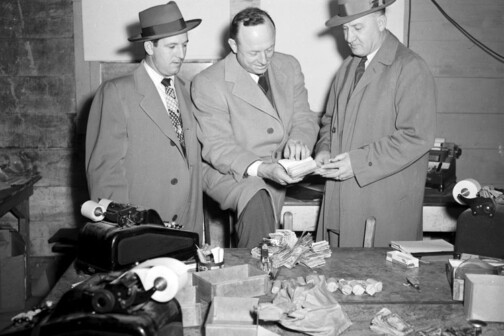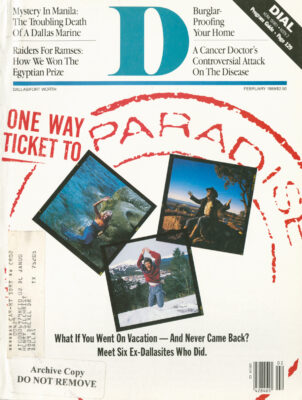Browsing through the Home Protection Centre Inc. in Pres- ton Royal Shopping Center is an eye- opening, chasten- ing experience. You stroll into the store firmly convinced that your home is, if not impervious to burglars, then at least reasonably safe from criminal assault. After all. you’ve got deadbolt locks. You’ve got a chain on the front door. You’ve got lights in the yard. You’ve got a killer Pekingese in the den. You’ve never been robbed, and no wonder. What else could you possibly need?
Well, how about an elaborate alarm system able to identify which part of the house has been disturbed? Or window screens with sensors woven into the mesh? Or motion detectors that shoot infrared beams and ultrasonic waves through the house? Or sound discriminators that trigger alarms when windows are broken or cut? Or pressure-sensitive mats that provide spot protection around entry ways? Or sirens that wail at an eardrum-rupturing 105 decibels? Or safes big enough to hold refrigerators? It’s enough to make you wonder whether it was providence or dumb luck that kept your home safe from burglars all these years,
But if you really want to give the old paranoia quotient a boost, have a friendly little chat with Peter M. Leftin, a South African who opened the Home Protection Centre about a year ago. He’ll tell you that the crime wave has only just begun and that cheap deadbolt locks and flimsy chains and phony alarm company decals are no longer enough to deter burglars from hitting your house. “Texans don’t have a clue,” he says. “They’re not security-conscious people. Until recently, they haven’t had to be. What is happening now is that people are going from having nothing to getting something that’s neatly packaged but totally useless. They do it because they think it’s better than nothing, and it’s all they can find in K mart.”
Okay, so maybe the quality of the merchandise isn’t the greatest, and maybe it provides more peace of mind than actual protection. At the very least, though, the fact that anti-theft devices are now sold in many department and hardware stores represents a major step in the right direction. Until recently, you understand, home security basically consisted of making sure the doors and windows were locked. Oh, you could find a handful of security companies listed in the Yellow Pages, but they specialized in commercial work. With residential burglaries so rare, most people thought spending thousands of dollars on a security system of their own was a needless extravagance. “It used to be that only the really affluent would put security systems in their homes,” says Ray Cherry, vice president of marketing at Smith Alarm Systems. Dallas’s oldest security company.
Of course, that was before crime became something approaching a national scourge. These days, the newspapers and airwaves are filled with stories about murderers who kick in front doors and rapists who jimmy open bedroom windows. And while this sort of violence remains the exception rather than the rule, property crime has reached near-epidemic proportions. The U.S. Department of Justice reports that more than 5 million house burglaries occur annually. The scorecard for Texas in 1987 featured 246.268 residential burglaries involving the loss of property valued at more than $300 million. In Dallas, the corresponding numbers were 27,661 residential burglaries-up 36 percent since 1983-and more than $43 million in stolen property.
And once property is stolen, forget about getting it back. The Dallas Police Department clears only one out of every seven residential burglaries. The recovery rate for stolen property is even lower-a paltry 8.4 percent. Obviously, the most effective way to protect your property is to prevent burglars from getting into your home in the first place. Unfortunately, this is easier said than done. “No matter what you do, short of hiring armed guards twenty-four hours a day, there’s no way to keep a burglar out of your home,” says Dallas Police Corporal Joe A. Walden.
That sounds bleak, but the situation may not be hopeless. Walden and several other officers in the Community Services Division lead crime prevention seminars and coordinate neighborhood watch programs. On request, they’ll also survey your home and recommend specific steps you can take to discourage burglars from dropping in. “The majority of your burglars are opportunists,” Walden explains, “so the harder you make them work to get into your home, the less likely you are to be burglarized.”
Walden says burglars seldom waste time picking locks or out-foxing security systems; their preferred modus operandi is kicking in the front door. The first order of business, then, is replacing flimsy hollow-core doors with stouter ones made of metal or solid wood. He strongly recommends installing high-quality deadbolt locks on all doors. You needn’t bother with chains: the tiny screws that secure them to the door frame aren’t strong enough to provide bona fide protection. By the same token, the deadbolt locks should come with a heavy-duty strikeplate and mounting screws that are at least three inches long.
Although doors are the most common point of entry for burglars, windows are even harder to protect. As Walden says, “Any time you have glass, you have a security weakness. There’s just no way around it.” As a result, police urge people to install auxiliary locks on all windows. Better still, they say. is the do-it-yourself technique of “pin-ning”-that is, drilling holes in the frame so nails can be inserted to prevent windows from opening past a certain point. Although pinned windows are cheap and effective, they won’t daunt smash-and-carry specialists who don’t mind breaking the glass. Burglar bars provide almost foolproof protection, but at a price. Besides posing a potential hazard in emergency situations requiring quick escapes, they also tend to produce a prison-like design motif.
These days, the hottest security trend is toward electronic alarm systems installed and monitored by one of the 300 or so security companies in Dallas. In fact, business is so good that the number of security companies licensed by the state is growing at a pace of about 20 percent a year-a healthy rate given the sagging economy.
For a no-expense-spared system able to protect your home from everything short of terrorist commandos or nuclear attack, these companies will charge as much as $6,000. Homeowners on a tighter budget, however, can usually get by with spending between $750 for a bare-bones system and $1,500 for a midrange job. The monitoring fee runs an additional $20 to $25 a month. “I think it’s well worth every cent,” says Shirley Bander, who had a system installed about a year ago. “It’s not that we have anything so expensive in the house. Probably the most expensive item is the alarm system. It’s just the idea. We don’t want anybody in our house.”
Most alarm systems incorporate magnetic contacts on exterior doors and windows. Opening these doors and windows while the system is “armed” triggers the alarm. Fine, unless the burglar chooses to smash the glass and enter through the window. To prevent this from occurring, more sophisticated systems involve motion detectors. Although these devices provide excellent interior protection, most of them can’t be used in areas where pets are allowed to roam. (Cats set off many more alarms than cat burglars.) For those who don’t want to banish their pets, noise discriminators or pressure-sensitive mats around the windows may be the answer.
When an alarm is triggered, it usually activates a siren loud enough to produce major-league headaches and adrenaline overdoses. But while the noise is disconcerting, it won’t necessarily send a burglar scampering. “A locally audible alarm system is a total waste of time,” Leftin says. ’A burglar knows that he has a minimum of fifteen minutes before somebody’s going to appear.” That’s why Leftin and most other security specialists recommend that alarm systems be monitored, typically via telephone lines, by security companies.
By law, security companies must be bonded, insured, and licensed by the Texas Board of Private Investigators and Private Security Agencies. (Beware of the many that are not. And remember, too. that even licensed firms aren’t necessarily above reproach. Several years ago, one such firm burned a Southeast Texas bank by installing electronic “sensors’” made entirely of plywood.) Exactly how they respond when alarms are triggered is governed by a combination of state statute and municipal ordinance.
In Dallas and most of its suburbs, security companies don’t seek police assistance until calling the client to verify that the alarm wasn’t triggered accidentally. If nobody answers or if the person who picks up the phone repeats the wrong secret code, the security firms then contact the police. Unless the resident has hit a “panic alarm” indicating an immediate threat, police don’t treat this as a top-priority call. As a result, it’s not uncommon to experience delays of as much as thirty minutes between the time the alarm sounds and the police arrive.
The exception to this rule is Highland Park, the only city that offers homeowners the option of having their residential alarm systems monitored by the police. (There’s an up-front equipment cost of between $200 and $340, a one-time phone-line charge of $87.30, and a monthly monitoring fee of $25.) Since this policy was inaugurated two years ago, the police have monitored 472 homes. For alarms triggered at these homes, Sergeant Larry Gentry says the average response time is a scant two minutes. “In fact, we’ve got burglars in jail that we caught in the house,” he says.
But even if your local police won’t respond that quickly, independently monitored alarm systems still make a lot of sense. At the very least, they serve as a deterrent. “About a year ago, we had a rash of break-ins on our street, and we were never touched,” says Jan Brans, who credits his alarm system-and prominent yard sign-for his good fortune. Also. when an independently monitored home is hit, the damage generally isn’t too severe. “That alarm system keeps burglars from spending a lot of time in your home,” Walden says. “They know they have to hit the door, grab the TV or whatever, and gel out. They can’t spend a couple of hours looking through drawers and closets.”
But perhaps the most ringing endorsement comes from Highland Park’s Gentry, who works in a city that monitors alarm systems but lives in a city that does not. “I recently got an alarm system for myself,” he says. “And until I got one, I wouldn’t have believed how much more secure I feel with it.”
Related Articles

Visual Arts
Raychael Stine’s Technicolor Return to Dallas
The painter's exhibition at Cris Worley Fine Arts is a reflection of her training at UTD—and of Dallas' golden period of art.
By Richard Patterson

Dallas History
Tales from the Dallas History Archives: Scenes from 1949, When the Mob Ruled Dallas
In 1949, streetcars still roamed Dallas' streets, the Adolphus Hotel towered over its neighbors downtown, the State Fair was still segregated, and Benny Binion wanted his money.

Business
Executive Travel: Beverly Hills, California
The Maybourne Beverly Hills is a luxurious home base to explore the best of Los Angeles, a frequent destination of Alto CEO Will Coleman.
By Will Maddox


